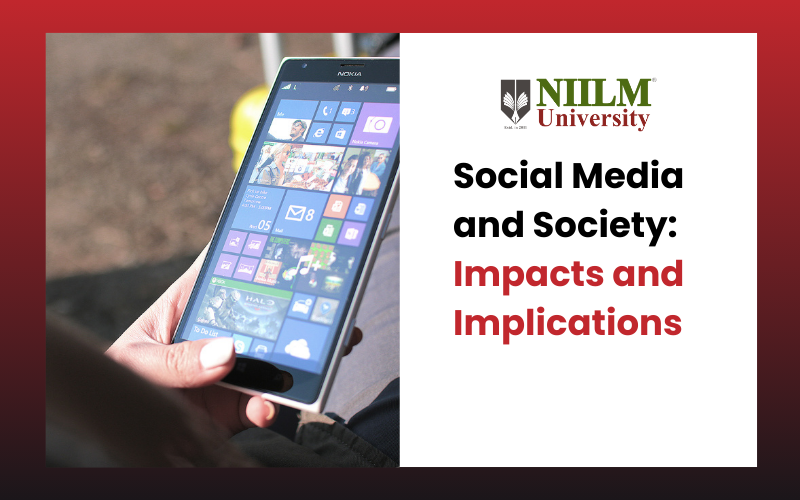Admission Enquiry

Explore the profound impacts and implications of social media on society, from communication and education to mental health and political polarization.
Social media has profoundly transformed the way people communicate, share information, and interact. Its impacts and implications on society are vast and multifaceted, influencing everything from personal relationships to political dynamics and cultural trends. This exploration examines the diverse effects of social media on society, considering both its positive contributions and potential drawbacks.
Enhancing Communication and Connectivity
Social media platforms like Facebook, Twitter, and Instagram have revolutionized communication, allowing people to stay connected with friends and family across the globe. These platforms enable instant sharing of experiences, thoughts, and news, fostering a sense of community and belonging. Social media also facilitates networking opportunities, connecting individuals with similar interests and professional aspirations.
Influence on Mental Health
While social media offers numerous benefits, it also poses risks to mental health. Studies have linked excessive social media use to anxiety, depression, and low self-esteem. The constant exposure to curated and idealized images of others' lives can lead to feelings of inadequacy and social comparison. Cyberbullying and online harassment further exacerbate these issues, particularly among younger users.
Political Engagement and Activism
Social media has become a powerful tool for political engagement and activism. Movements like #BlackLivesMatter, #MeToo, and the Arab Spring have harnessed social media to raise awareness, mobilize supporters, and drive social change. These platforms provide a voice to marginalized groups and facilitate grassroots organizing, making political participation more accessible.
Spread of Misinformation and Fake News
One of the significant challenges posed by social media is the spread of misinformation and fake news. The viral nature of social media allows false information to spread rapidly, influencing public opinion and undermining trust in traditional news sources. This phenomenon has significant implications for democracy and informed decision-making.
Cultural Impact and Trends
Social media shapes cultural trends and influences public discourse. Platforms like TikTok and Instagram are trendsetters, dictating fashion, music, and lifestyle choices. Social media influencers wield significant power, often driving consumer behavior and cultural norms. This dynamic has created new opportunities for creativity and entrepreneurship while also raising concerns about authenticity and consumerism.
Privacy and Data Security
The use of social media raises critical issues regarding privacy and data security. Platforms collect vast amounts of personal data, often without users' explicit consent, leading to concerns about data breaches and misuse. The Cambridge Analytica scandal highlighted how personal data can be exploited for political purposes, prompting calls for stronger privacy regulations.
Impact on Journalism and Information Consumption
Social media has transformed the landscape of journalism and information consumption. News is now disseminated in real-time, and users can access diverse perspectives from around the world. However, the rise of citizen journalism and the decline of traditional media outlets have raised questions about the quality and reliability of information. The pressure for quick, sensationalist content can compromise journalistic integrity.
Social Media and Business
Businesses leverage social media for marketing, customer engagement, and brand building. Platforms like LinkedIn, Facebook, and Instagram provide tools for targeted advertising and real-time customer feedback. Social media has democratized marketing, allowing small businesses to compete with larger corporations. However, it also requires businesses to navigate challenges related to reputation management and digital marketing ethics.
Education and Learning
Social media is increasingly integrated into educational environments, offering new opportunities for learning and collaboration. Platforms like YouTube and LinkedIn Learning provide access to educational content and professional development resources. Social media also enables peer-to-peer learning and global classroom connections. However, it also necessitates digital literacy and critical thinking skills to navigate the vast amounts of information available.
Conclusion
Society is profound and complex, encompassing both positive contributions and significant challenges. It enhances communication and connectivity, fosters political engagement and activism, and shapes cultural trends. However, it also poses risks to mental health, spreads misinformation, and raises privacy concerns. As social media continues to evolve, it is essential to critically examine its implications and develop strategies to harness its benefits while mitigating its drawbacks.
Frequently Asked Questions (FAQs)
Q1. How has social media influenced communication among individuals and communities?
A1. Social media has revolutionized communication by allowing instant, global interaction. It enables individuals to maintain relationships, form new connections, and engage with communities regardless of geographical boundaries. Platforms like Facebook, Twitter, and WhatsApp facilitate both personal and professional communication, fostering a sense of global interconnectedness.
Q2. What are the positive impacts of social media on society?
A2. Positive impacts include enhanced communication and connectivity, rapid dissemination of information, increased awareness of social issues, educational opportunities, and the growth of businesses through marketing and customer engagement. Social media also empowers individuals to voice their opinions and participate in social and political movements.
Q3. How does social media affect mental health?
A3. Social media can negatively impact mental health by contributing to anxiety, depression, and feelings of loneliness. The pressure to present a perfect life and the constant comparison with others can lead to low self-esteem and a sense of inadequacy. However, it can also provide support networks and communities for those dealing with mental health issues.
Q4. What are the challenges of misinformation on social media?
A4. Misinformation and fake news can spread rapidly on social media, leading to widespread misconceptions, panic, and harmful behaviors. This poses challenges for content regulation, verification of information, and the development of effective strategies to combat the dissemination of false information.
Q5. How does social media impact privacy and security?
A5. Social media users often share personal information, which can be at risk of data breaches, identity theft, and privacy violations. Social media companies collect extensive user data, raising concerns about how this information is used and protected. Ensuring data security and privacy remains a significant challenge.
Copyrights © 2024 NIILM UNIVERSITY. All rights reserved.